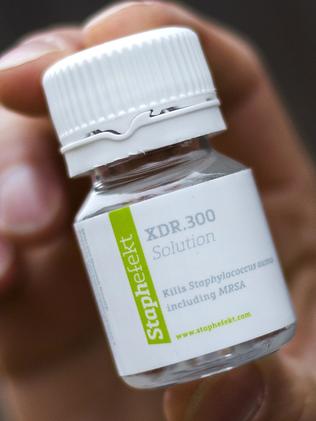Dutch biotech company says new drug could be breakthrough in fight against antibiotic-resistant superbugs
IT’S been the looming catastrophe that threatened to take us back to the ‘dark ages of medicine’ — but scientists say they have a new weapon to take on the superbugs.

IT’S been a looming public health catastrophe, but scientists believe they may have made a breakthrough in the fight against drug resistant superbugs.
Dutch biotechnology company Micreos has developed a new drug, Staphefekt, which its chief executive Mark Offerhaus hailed as the start of “a new era in the fight against antibiotic-resistant bacteria”.
EARLIER: The spread of the superbugs
EARLIER: Gonorrhoea ‘sex superbug’ in Australia
The drug has had encouraging results in both laboratory and human trials, offering hope in the fight against the rise and rise of drug-resistant superbugs.
The Times reports that 5000 people die in the UK each year because of antibiotic-resistant diseases — a frightening statistic which prompted British Prime Minister David Cameron to warn that losing the fight would take the world back to the “dark ages of medicine”.

Staphefekt was shown to be effective in treating the superbug MRSA and the company could have the drug on the market within five years, the Times reported.
“Millions of people stand to benefit,” Mr Offerhaus said. “That’s very exciting and gratifying.”
Unlike traditional antibiotics, which work from within cells, the new drug latches onto the surface of bacterial cells in order to break them down.
The breakthrough has been hailed by epidemiologists and other researchers.
“We’re so desperate for new alternatives and this one looks like it’s at the leading edge,” infectious diseases expert Brendan Wren told the Times.
Micreos presented its research at the Antibiotic Alternatives for the New Millennium conference in London this week.
Conference delegates also heard about developments in on-the-spot tests for infections which could cut down the overprescribing of antibiotics.
Antibiotics are ineffective against viral infections, which are often the cause of colds, coughs and sore throats. But when GPs are put under pressure by sick patients — or worried parents — many cave in and prescribe them, it is believed.
Earlier this year the UK’s chief medical officer, Dame Sally Davies, said that pushy patients were partly to blame for the rise of superbugs.


Researchers found that when doctors used the three-minute test, they ended up prescribing fewer drugs.
Currently, the type of infection — bacterial or viral — can be confirmed only with a blood test analysed in a lab, a process that can take two to three days.
But researchers say the on-the-spot tests could guide doctors to target antibiotic use in patients.
The researchers looked at trials on the C-reactive protein (CRP) test. Low levels of the protein may effectively rule out serious bacterial infection, meaning antibiotics would be unnecessary. The review found the test lowered antibiotic use by 22 per cent.



